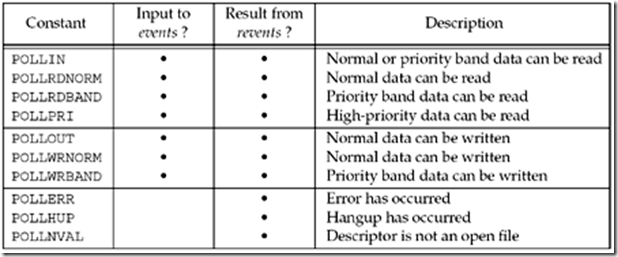unix下网络编程之I/O复用(三)
poll函数
在上文unix下网络编程之I/O复用(二)中已经介绍了select函数的相关使用,本文将介绍另一个常用的I/O复用函数poll。poll提供的功能与select类似,不过在处理流设备时,它能够提供额外的信息。
poll函数原型:
#include<poll.h> int poll (struct pollfd * fdarray , unsigned long nfds , int timeout); //返回:就需描述字的个数,0——超时,-1——出错
第一个参数是指向一个结构数组第一个元素的指针,每个数组元素都是一个pollfd结构。如下:
struct pollfd {
int fd; //descriptor to check
short events; //events of interest on fd
` short revents; //events tha occurred on fd
}
要测试的条件由events成员指定,函数在相应的revents成语中返回该描述字的状态。(每个描述字都有两个变量,一个为调用值,另一个为返回结果,从而避免使用值-结果参数,这与select函数是不同的)。下图列出了用于指定events标志以及测试revents标志的一些常值。
上图需要注意的是,POLLERR,POLLHUP,POLLNVAL是处理错误的描述字,因此它们也就不可以出现在input事件中,即events。poll识别三类数据:普通(normal),优先级带(priority band)和高优先级(high priority)。
对TCP和UPD而言,以下条件引起poll返回特定的revents。
1、 All regular TCP data and all UDP data is considered normal.
2、 TCP's out-of-band data (Chapter 24) is considered priority band.
3、 When the read half of a TCP connection is closed (e.g., a FIN is received), this is also considered normal data and a subsequent read operation will return 0.
4、 The presence of an error for a TCP connection can be considered either normal data or an error (POLLERR). In either case, a subsequent read will return –1 with errno set to the appropriate value. This handles conditions such as the receipt of an RST or a timeout.
5、 The availability of a new connection on a listening socket can be considered either normal data or priority data. Most implementations consider this normal data.
6、 The completion of a nonblocking connect is considered to make a socket writable.
——《unix网络编程》第三版
参数nfds,指示结构数组中元素的个数。
参数timeout:
与select中的timeout不同,poll函数的timeout参数是一int值,表示poll函数返回前等待多长时间,它是毫秒级别的。它有三种情况的取值:1、INFTIM(一个负数值),表示永远等待,即一直阻塞。2、0,表示立即返回,非阻塞。3、>0,表示正待指定数目的毫秒数。
poll函数的返回值:
当poll发生错误时,poll函数的返回值-1,若定时器时间到之前没有任何描述字就绪,则返回0,否则返回就绪描述字的个数,即其revents成员值非0的描述字个数。
如果我们不再关心某个特定描述字,那么可以把与他对应的pollfd结构的fd成员设置成一个负值。poll函数将忽略这样的pollfd结构的events成员,返回时将它的revents成员的值置为0。
poll函数的通信列子:一个简单的TCP回射服务器程序
pollServer.c:使用select机制的服务器程序
#include <stdio.h>
#include <string.h>
#include <arpa/inet.h>
#include <netinet/in.h>
#include <sys/socket.h>
#include <poll.h>
/*环境为ubuntu10.04自带c环境,无法自动引入下列宏,所以自己写在前面了*/
#define INFTIM -1
#define POLLRDNORM 0x040 /* Normal data may be read. */
#define POLLRDBAND 0x080 /* Priority data may be read. */
#define POLLWRNORM 0x100 /* Writing now will not block. */
#define POLLWRBAND 0x200 /* Priority data may be written. */
#define MAXLINE 1024
#define OPEN_MAX 16 //一些系统会定义这些宏
#define SERV_PORT 10001
int main()
{
int i , maxi ,listenfd , connfd , sockfd ;
int nready;
int n;
char buf[MAXLINE];
socklen_t clilen;
struct pollfd client[OPEN_MAX];
struct sockaddr_in cliaddr , servaddr;
listenfd = socket(AF_INET , SOCK_STREAM , 0);
memset(&servaddr,0,sizeof(servaddr));
servaddr.sin_family = AF_INET;
servaddr.sin_port = htons(SERV_PORT);
servaddr.sin_addr.s_addr = htonl(INADDR_ANY);
bind(listenfd , (struct sockaddr *) & servaddr, sizeof(servaddr));
listen(listenfd,10);
client[0].fd = listenfd;
client[0].events = POLLRDNORM;
for(i=1;i<OPEN_MAX;i++)
{
client[i].fd = -1;
}
maxi = 0;
for(;;)
{
nready = poll(client,maxi+1,INFTIM);
if (client[0].revents & POLLRDNORM)
{
clilen = sizeof(cliaddr);
connfd = accept(listenfd , (struct sockaddr *)&cliaddr, &clilen);
for(i=1;i<OPEN_MAX;i++)
{
if(client[i].fd<0)
{
client[i].fd = connfd;
client[i].events = POLLRDNORM;
break;
}
}
if(i==OPEN_MAX)
{
printf("too many clients! \n");
}
if(i>maxi) maxi = i;
nready--;
if(nready<=0) continue;
}
for(i=1;i<=maxi;i++)
{
if(client[i].fd<0) continue;
sockfd = client[i].fd;
if(client[i].revents & (POLLRDNORM|POLLERR))
{
n = read(client[i].fd,buf,MAXLINE);
if(n<=0)
{
close(client[i].fd);
client[i].fd = -1;
}
else
{
buf[n]='\0';
printf("Socket %d said : %s\n",sockfd,buf);
write(sockfd,buf,n); //Write back to client
}
nready--;
if(nready<=0) break; //no more readable descriptors
}
}
}
return 0;
}
客户端程序参考上一篇文章。
总结:
本文介绍了poll函数的原型,参数说明,注意事项以及一个简单的代码例子。在unix后续版本中,加入了epoll函数I/O复用机制,它在一定条件下更加高效,在以后的文章中,会对epoll机制再进行详细的描述。之前在学习python的时候,也接触了select和poll,但是当时了解的比较浅显,希望通过最近的学习可以对unix下I/O复用有更深入的认识。



